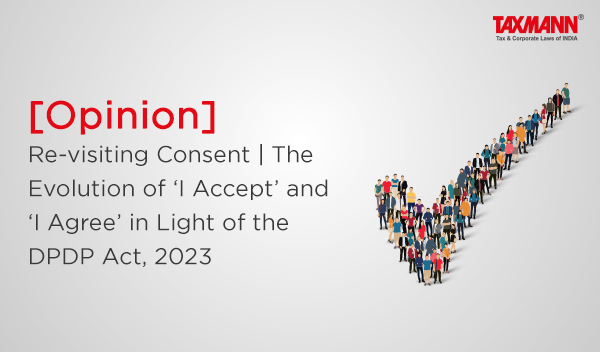[Opinion] Re-visiting Consent | The Evolution of ‘I Accept’ and ‘I Agree’ in Light of the DPDP Act, 2023
- Blog|News|Company Law|
- 2 Min Read
- By Taxmann
- |
- Last Updated on 30 November, 2023

CS Pradnesh Kamat & Veerti Shah – [2023] 156 taxmann.com 710 (Article)
In our everyday digital lives, we often encounter electronic contracts without even realizing it. These contracts quietly play a role in shaping our online experiences, acting as the architects of our virtual engagements. When we click through applications, software, or websites, we are not just scrolling and clicking; we are entering into legitimate, binding and enforceable agreements, although in a digital form. These agreements, made in pixels rather than with a pen, silently influence the way our online transactions unfold.
Given our tendency to skim through the fine print of those cookie agreements, our consent often unfolds unwittingly. Yet, behind the scenes, cookies wield the power to delve into your online pursuits, acquiring sensitive data that may find its way into the hands of advertisers and third parties. While this practice is the origin of the realm of targeted advertising, it simultaneously unfurls the daunting threat of sensitive information slipping into disreputable hands. Beyond mere data collection, cookies harbor the capability to shadow your virtual movements, meticulously crafting a mosaic of your interests and, in some instances, deducing your whereabouts. This intricate design of digital surveillance, weaves a narrative of privacy concerns and the potential pitfalls of our somewhat unconscious online agreements.
End User License Agreements
Like any online agreements, End User License Agreements, commonly found in nearly every one-sided e-contract, fall under the expansive category known as “Click Wrap Agreements.” Functioning through user-friendly clicks, these agreements offer options like “I accept,””I agree,””Ok,” or “I consent.” In this digital ballet of interactions, users engage with these prompts, often unaware that they are actively shaping legal agreements with a simple click. The seemingly straightforward nature of these options masks the legal weight they carry, illustrating the subtle power dynamics embedded within the user’s virtual journey. However, we must determine the implications of such contracts.
In Rudder v. Microsoft Corporation [1992], 2 CRR (4th) 474, the plaintiffs contended that they should not be beholden to specific terms outlined in Microsoft’s “Member Agreement” due to their failure to peruse the entire agreement before electronically endorsing it. However, the Ontario Superior Court of Justice, led by Justice Winkler, rendered a different verdict. Justice Winkler asserted that the obligation to scroll through the “Member Agreement” was essentially tantamount to the traditional act of flipping through pages in a multi-page document. Consequently, as a general principle, the court affirmed that when we click to agree, we are, in fact, legally bound by the online terms and conditions, irrespective of whether we meticulously read through them or not.
Furthermore, the legal precedent set forth by the Supreme Court in the case of Trimex International FZE v. Vedanta Aluminum Limited, 2010 (1) SCALE 574, unequivocally affirms that digital forms of approval carry equal weight and validity as their traditional written counterparts. The Court’s ruling extends this recognition to encompass even the realm of email correspondence, solidifying the standing of electronic approvals within the legal framework. This landmark decision serves as a cornerstone, establishing that the mode of approval, whether digital or written, does not undermine the legitimacy of the consent provided.
Click Here To Read The Full Article
Disclaimer: The content/information published on the website is only for general information of the user and shall not be construed as legal advice. While the Taxmann has exercised reasonable efforts to ensure the veracity of information/content published, Taxmann shall be under no liability in any manner whatsoever for incorrect information, if any.

Taxmann Publications has a dedicated in-house Research & Editorial Team. This team consists of a team of Chartered Accountants, Company Secretaries, and Lawyers. This team works under the guidance and supervision of editor-in-chief Mr Rakesh Bhargava.
The Research and Editorial Team is responsible for developing reliable and accurate content for the readers. The team follows the six-sigma approach to achieve the benchmark of zero error in its publications and research platforms. The team ensures that the following publication guidelines are thoroughly followed while developing the content:
- The statutory material is obtained only from the authorized and reliable sources
- All the latest developments in the judicial and legislative fields are covered
- Prepare the analytical write-ups on current, controversial, and important issues to help the readers to understand the concept and its implications
- Every content published by Taxmann is complete, accurate and lucid
- All evidence-based statements are supported with proper reference to Section, Circular No., Notification No. or citations
- The golden rules of grammar, style and consistency are thoroughly followed
- Font and size that’s easy to read and remain consistent across all imprint and digital publications are applied



 CA | CS | CMA
CA | CS | CMA
